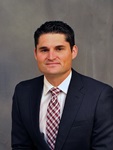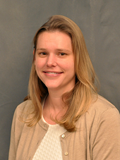Outstanding Early Career Scholar Program

The Department of Medicine, through this program, invests in the career development of each Scholar, and is not limited to a specific research project or scholarly activity. Early Career Scholars will be expected to commit 75% of their effort to scholarly activities. The Outstanding Early Career Scholar Program will provide each Scholar with $75,000 annually for up to four years. These funds will only be used to support the career development, research, or innovative work of the Scholar. These funds cannot be used to support or supplement the Scholar’s salary. Progress will be evaluated every year.
Department of Medicine Announces 2021 Outstanding Early Career Scholars

William (Bill) K. Cornwell MD, MSCS, is an assistant professor of medicine in the Division of Cardiology. His clinical interests include managing patients with advanced heart failure, as well as those who
are supported by mechanical circulatory support devices and transplants. In addition, Dr. Cornwell has a strong interest in exercise science, sports cardiology and altitude medicine, and directs the Sports Cardiology Clinic at the University of Colorado
Anschutz Medical Campus.
His primary research interest is understanding the limits of human performance across the spectrum of health and disease, ranging from professional/elite athletes, to recreational athletes and healthy sedentary
individuals, patients with ambulatory cardiovascular and pulmonary disease, congenital heart disease, and heart failure patients supported by mechanical circulatory support devices. The OECSP award will be used to characterize cerebrovascular, cardiopulmonary
and autonomic physiology at rest and during exercise in these populations, to ultimately develop innovative protocols focused on improving patient quality of life and outcomes.
“Bill is a truly deserving recipient who excels
in all three foundational academic domains,” said Peter Buttrick, MD, head of the Division of Cardiology. “He is a gifted clinician and educator and his research program is remarkable. He is very interested in the physiology of exercise
and how very distinct patient groups, ranging from elite athletes to LVAD recipients, are able to modulate cardiac output. The work is meticulous and highly impactful. Moreover, there are very few laboratories in the country that are equipped to ask
and answer these questions. We are fortunate to have him as a member of our faculty.”
Dr. Cornwell conducts his research within the Clinical Translational Research Center at the CU Anschutz Medical Campus, where he developed and oversees
an advanced integrative physiology laboratory. His research is supported by NIH/NHLBI and multiple partnerships with industry. .jpg?sfvrsn=7c49f3ba_0&MaxWidth=160&MaxHeight=160&ScaleUp=false&Quality=High&Method=ResizeFitToAreaArguments&Signature=03771B7C330AAB2278A21743EA57892506DC26CF) Katharina Hopp, PhD, is an assistant professor of medicine in the Division of Renal Diseases and Hypertension. Her laboratory studies mechanisms that modulate Autosomal Dominant Polycystic Kidney Disease (ADPKD) progression, the most prevalent inherited nephropathy worldwide. She uses orthologous murine models to study the disease and translate her findings into novel treatment approaches. In particular, her research interest lies in the role of immune cells in regulating kidney cysts growth. To that end, she found that the cystic immune microenvironment displays multiple features of immunosuppression and that CD8 T cells halt cysts growth.
Katharina Hopp, PhD, is an assistant professor of medicine in the Division of Renal Diseases and Hypertension. Her laboratory studies mechanisms that modulate Autosomal Dominant Polycystic Kidney Disease (ADPKD) progression, the most prevalent inherited nephropathy worldwide. She uses orthologous murine models to study the disease and translate her findings into novel treatment approaches. In particular, her research interest lies in the role of immune cells in regulating kidney cysts growth. To that end, she found that the cystic immune microenvironment displays multiple features of immunosuppression and that CD8 T cells halt cysts growth.
“Dr. Hopp is an extraordinary young investigator with an outstanding track record in research and education,” said Michel Chonchol, MD, head of the Division of Renal Diseases and Hypertension. “Dr. Hopp is an integral part
of the autosomal dominant polycystic kidney disease program and initiated a highly innovative research program focused on the role of the microenvironmental immune cells in PKD progression. Dr. Hopp has been recognized in the PKD community, nationally
and internationally. Her accomplishments and commitment to academic science make her a well-deserving recipient of this prestigious DOM award.”
Dr. Hopp will use this award to investigate how dysregulated metabolism impacts immune
cell function in the setting of PKD. Metabolic reprogramming is a well-established feature of ADPKD. In cancer, a disease with many parallels to PKD, the metabolic landscape created by tumors has been shown to critically impact immune cell function
and subsequent tumor growth. This relationship has not been studied in PKD and holds promise for new treatment approaches. Dr. Hopp will utilize cell type specific profiling technologies, genetic mouse models, and preclinical studies to delineate
how the metabolic demands of the cystic kidney epithelium impact the surrounding immune cells and their role in regulating cyst growth.

Christine Swanson, MD, MCR, is an assistant professor of medicine in the Division of Endocrinology, Metabolism and Diabetes. Her research focuses on the skeletal effects of insufficient sleep and night shift work. Her work was the first
to demonstrate acute adverse bone turnover marker changes in humans in response to abnormal sleep schedules. Over time, these changes would be expected to cause bone loss, suggesting that disrupted sleep may be a novel, modifiable risk factor for
osteoporosis and fracture.
She has a clinic focused on metabolic bone disease and disorders of calcium/vitamin D and is the clinical director for the High Resolution peripheral Quantitative Computed Tomography (HR-pQCT) instrument
that will arrive at the CU Anschutz Medical Campus in fall 2021. This research device was obtained through a collaborative S10 application to NIGMS and provides non-invasive imaging of bone microarchitecture/quality in cortical and trabecular compartments
in humans.
“Dr. Swanson has done an amazing job of combining sleep disturbances and adverse effects on bone health,” said Bryan Haugen, MD, head of the Division of Endocrinology, Metabolism and Diabetes. “She
has quickly become a nationally recognized expert in this important field. Dr. Swanson has also been an invaluable leader in our clinical metabolic bone program. She is truly a rising star in academic medicine.”
Dr. Swanson
will use this award to expand the scope of her R01 from NHLBI that will investigate the effects of night shift work on bone metabolism, density, and microarchitecture, and to investigate other novel risk factors for osteoporosis (e.g., recreational
and medical marijuana use).
Review Committee for the 2021 OECSP selection process:
Review Committee Chair: Linda van Dyk, PhD, Professor, Department of Immunology and Microbiology
Glenn Furuta, MD, Professor, Department of Pediatrics, Children's Hospital Colorado
Peter Henson, MD, PhD, Professor, Department of Biomedical Research, National Jewish Health
Anne Libby, PhD, Professor, Department of Emergency Medicine
Martin McCarter, MD, Professor, Department of Surgery
Jill Slansky, PhD, Professor, Department of Immunology and Microbiology
Raul Torres, PhD, Professor, Department of Immunology and Microbiology
Dates for Funding Cycles:
Application Deadline | TBD |
|---|---|
| Award Start Date | TBD |
Questions? Contact Jennifer Kemp, PhD, at JENNIFER.T.KEMP@CUANSCHUTZ.EDU